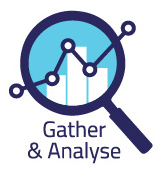
"My attraction to data - how it can be refined into insights and predictions, like turning freshly picked coffee fruit into the perfect ristretto - led me to become a data scientist. It seems there is some demand for that, which is lucky!"
-Jean-Baptiste Rouquier, Data Scientist
After planning your research and getting a good overview of your chosen field, it’s time to gather together your data and analyse it. There are a wealth of collection methods and methodologies for gathering and interpreting data.
It’s also worth thinking about how you will manage your data. This could mean thinking about the ethical considerations around your data, how it will formatted and stored, and how you can eventually share and reuse your data. A Data Management Plan is very useful here. They are also an essential component of many funder agreements. For more information, please see the Research Innovation Office pages on RDM and Funder Requirements, and the Governance Services pages on Processing Data for Research Purposes.
You will find that there are an abundance of analytical tools at your disposal so you may want to consider training opportunities in more than one programme. Critical thinking and reflection are also integral to all your activities as a researcher, but especially so for evaluation, research data collection and statistical analysis.
Guides